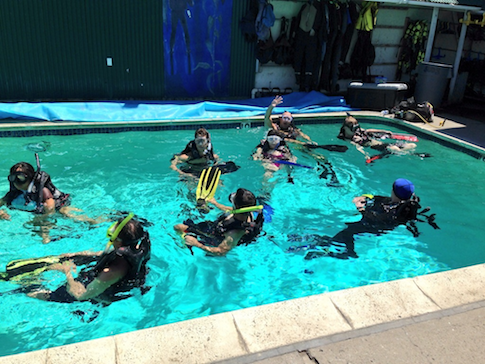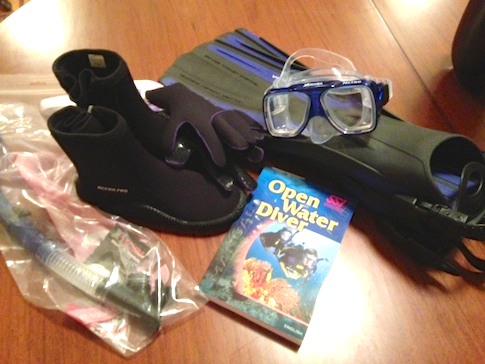
Ever since I was a kid, I’ve been fascinated by the ocean and marine life. As much as I love the water, I’m humbled and intimidated by it as well. This past Spring I got a taste of scuba diving, which I never imagined I’d ever have the nerve to try. It was a thrill of a lifetime. And now I’ve made the bold decision to get my scuba diving certification!
When I was younger I dreamed of becoming a marine biologist. But my practical side told me no and I didn’t pursue it. Fortunately I found other ways to bring my love of the water into my life, just not as a career. I centered a lot of my travels around coastal areas, hiked along many beaches, watched lots of ocean related videos, and did a fair amount of water activities.
How My Obsession Began
Then I developed an obsession of swimming with marine animals. 🙂 It started with a dolphin encounter I had in the Bahamas many years ago. It was the happiest day of my life at the time and I was hooked. I went on to swimming at the surface with more dolphins, manatees, sea turtles, and even Galapagos sharks! It’s so much fun I can’t get enough. I even have a crazy dream on my bucket list to swim with whale sharks (which are enormous) and other exotic marine life below the surface.
To get closer to that dream becoming a reality, I have to take a big step past snorkeling and get my scuba diving certification. It’s super exciting, it’s a little bit scary, it’s untemplate, and it’s expensive. But I’m determined to do it! Now is the time for me to go for it while I’m still young, healthy, and willing to push myself.
Overcoming Almost Drowning And Jumping Into Scuba Diving
As much as I love the water, it still intimidates me at times. The main reason is because I almost drowned when I got caught in a rip current on vacation when I was in my early 20’s. Fearing for your life underwater not knowing which direction is up is an extremely terrifying feeling. I know it sounds unrealistic not being able to tell which way the surface is, but when you’re caught in a rip current it’s true. Waves can be immensely powerful and thank goodness my best friend who is strong swimmer, was nearby and saw me underwater that day, and was able to pull me out to safety.
I’ve never underestimated the ocean since! Initially I didn’t want to go back in the water after that experience. But I couldn’t let one unfortunate event paralyze me with fear and ruin my love of the ocean. So I forced myself to get back in the water the very next day, paying more attention to the currents, and slowly started going back into deeper water.
Naturally I had a lot of anxieties about going deep below the surface with scuba diving, but I embraced my fears, did some research, and tried it just a few months ago. Now that I’ve gone on two shallow dives already, I have the confidence that I can get my scuba diving certification and go on even more amazing dives all over the world.
How To Get A Scuba Diving Certification
Here’s a glimpse into my untemplate journey to get my scuba diving certification. If someone like me can get over my fear of drowning, I know you can too if scuba diving is something you want to learn. Here are the basic steps required to getting certified.
- Learn how to swim & get in shape. You need to be in good health to be able to scuba dive. And while you don’t have to be a strong swimmer, you need to be comfortable in the water. It also helps if you’ve gone snorkeling before and have practiced breathing only through your mouth.
- Find a reputable school. I chose the Bamboo Reef diving school in San Francisco. They are a SSI Platinum Facility and well rated locally. SSI stands for Scuba Schools International btw and is recognized worldwide. Another widely accepted scuba diving certification program is through PADI (Professional Association Of Diving Instructors). The main difference is that SSI offers instructors more flexibility and that can make the experience more comfortable for their students.
- Attend orientation. I attended a free orientation at my dive school. They told us about the school’s program and answered our questions. We also watched 2 short videos and started our official certification paperwork. My school gives us one year from the day we attend orientation to complete the coursework, pool training, and 2 days of open water dives. If your school doesn’t offer orientation, make sure to clarify their program costs, policies, and the duration up front.
- Do your homework. Like learning anything new, there is studying involved with obtaining a scuba diving certification. My school requires us to complete all the homework in our SSI course book before attending our first class. My SSI course book came with a dvd which makes it more fun to learn and complete the quizzes.
- Get geared up. My scuba school requires us to get our own basic gear (mask, snorkel, fins, boots, gloves). They have a fully stocked shop with lots of options from basic to advanced. It really helps to try equipment on before purchasing it because fit is key. A well fitting mask is the most important piece of equipment you should buy for yourself.
- Practice and prepare. Use the time in the pool to practice clearing your mask of water, learn to control your buoyancy, and practice hand signals. Get comfortable breathing through the regulator, and yes the air is very dry! Be patient with yourself, stay relaxed, and give it your best effort. Your instructor will show you everything you need to know.
- Pass the written and open water tests. You’ll need to pass a written test as well as skill test in the open water to get your scuba diving certification. The open water assessment takes place over two days and both days must be done by the same instructor.
- Go out and have fun! Once you’ve passed and completed all those steps you’re an official scuba diver! Then you can go out and have a blast exploring the ocean and it’s incredible marine life. There are fabulous dive sites all over the world and at all different temperatures. I’ll be braving the cold waters of Monterey Bay in a thick wet suit for my open water dives.
How Much Does It Cost To Get A Scuba Diving Certification?
Costs can vary depending on your location, school, and type of certification you want. There are actually many levels of scuba diving certification you can get, for ex. using nitrox gas, performing rescues, etc. But everyone needs the basic certification first. Here’s a breakdown of what I’m paying for my scuba diving certification to give you an idea of the costs.

Orientation and paperwork: Free
Basic Dive Kit: $164.88 (About a $44 savings buying them in a kit)
- Snorkel $24.95
- Mask $53.95
- Fins $89.99
- Boots $41.50
Gloves $33.00
Course book, DVD, Dive log book: $79.95
Classroom & Pool Training: $249.99
Wetsuit & Tank Rental for Open Water Dive Tests: $100.50
Total after tax: $652.63
Scuba Diving Resources & Recommendations
Want to learn more about scuba diving? Check out these excellent resources and gear. Once I master scuba diving, my next goal is to get into underwater photography!
Diving / Scuba Mask with GoPro Hero 3 Mount
The Underwater Photographer
So if all goes well in about one month from now I’ll officially be a certified scuba diver. Wish me luck!
Untemplaters, have you ever thought about or tried scuba diving? Are you into any type of extreme or adventure sports? What’s the coolest animal or fish you’ve seen in the water?
Copyright 2013. Original content and photography authorized only to appear on Untemplater.com. Thank you for reading!
Great tips Sydney, thank you
I must agree that scuba diving can be a bit pricey, especially if you are just starting. Learning the necessary skills and obtaining the equipment that you need requires spending a lot of cash but the rewards are priceless and you can’t put a price tag on them.
Oh my gosh I totally agree the rewards are priceless. I’m so glad I got over my fear of going under the water!
Just running for me so far in terms of sports, scuba diving seems to be quite pricey at first glance! Hope you are going to enjoy it as much as you have imagined though!
Yeah it definitely is a commitment and is not cheap. I’m having to do a lot of extra savings the rest of the year to make up for the costs. I think it’s worth it in the long run though because the certification is good for life! There are so many incredible places to dive and since I like to travel to places by the water, scuba will be something I can incorporate into pretty much all my travel from now on. 🙂
My interest has always been rock climbing. I did a lot of indoor gyms when I was in college, but now I’d like to travel and do the real stuff.
Awesome! That is opening the door to many more adventures. I got my certifications in Utila, Honduras, 10 years ago, the 5 day course cost $100 haha. Apparently it is still the cheapest place in the world to get certified, and you can do it in a week for less than you would in NA or Europe, flights and accommodation included in a beautiful Caribbean island.
Little pricey for me at this point considering I dont even know how to swim. Speaking of which I really need to learn. One of my older bosses loved going out scuba diving and living here in FL there are a lot of places I could go.
Big bucks! It’s too bad the equipment and courses cost so much, but it’s always the case when one first starts out. I can wait to learn and swim with the fishies as well. Scuba brings a whole new dimension to vacationing in the tropics.
Palau here I come!!